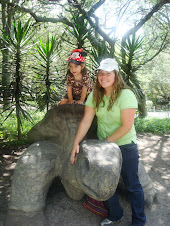Otavalo (It’s A-L-P-A-C-A!!!)
My first complete weekend adventure was to the largest open-air indigenous market in the world which has been hosted for hundreds of years in the Andes. A large group of gringitos and I took a packed bus which serpentined up and down the peaks and valleys of the Northern Highlands. Imagine the drive out to the Highland County Maple Festival and just magnify it by a scale of several thousand feet. Every time I smelt something burning, I was just sure it was the brakes. We pasted the picturesque snow dusted peak of the Volcán Cuyambe as well as the Volcán Imbabura, which is circumscribed by Lago San Pablo.
We arrived near dusk and checked into our hostel where we each paid 5 dollars for sweet hospitality, a comfy twin topped with an alpaca blanket, and even the all inclusive luxury of a shower with hot water. We had soups and jugos (fresh fruit juice) at a little restaurant the owner of our hostel recommended where we ran into some seminary students who are studying in northern Quito. It’s always exciting to bump into other extranjeros and hear their stories.
After that a group of us decided to discover the local night life, so we toured the streets where Otavaleños had huge pots of soup stewing, choclo (corn on the cob) roasting over searing coals, and whole pigs speared on a spit. The music lured us to this vibrating little club called Jala Jala where the dance floor perspired and the walls echoed the soothing rhythms of the tenor sax. The trumpet player effortlessly blasted a high C and had a pitch similar to that of the great Arturo Sandoval. An array of percussion and a set of maracas paced the beat while a trio sang songs of love and life. I must say, my friends from up north have some impressive moves and a flair for the dance club scene. We literally salsa danced the night away. Word to the wise; never sit down in a club in Ecuador because that means you are just begging for a partner and one will present himself immediately and you won’t be able to turn him away.
In the morning we decided to check out the animal market which may or may not have been a devastating mistake. Hogs were being herded down the street, chickens were bundled in piles like bouquets of flowers, lambs were being drug beneath woolen skirts, and some individual cages contained chickens, geese, rabbits, guinea pigs, and kittens all in one. After several tormented cries of why do people do this when you can just go to the supermarket, I was reassured, that we are in fact only one generation away from not knowing where our food comes from. I’m not going to lie though, even being the tough farm girl that I am; the pedaling of precious little guinea pigs did get to me, especially, when I thought of Mom’s adored, chubby pre-school pet, Cupcake.
Grotesque as it may seem to most, it was a glance at natural subsistence style farming and living with the coined environmental slogan of ‘Buy Local, Think Global’ at its core. Even though I whole heartedly support this mentality, throwing aside all nine premises of Regan’s Sentience of Animals philosophy, I know it is light-years away from curing world hunger at this current juncture given the salinization and nitrogen fixation of the world’s soils and increased carbonization of the atmosphere. For now, I’m a realist masquerading as an idealist on this point.
25% percent of the Ecuadorian population has indigenous roots with more than a dozen different groups who speak over twenty languages. Otavaleños are renowned for their colorful and exquisite tejidos (weavings) and they have been exploited for their textiles by the Incas, Spanish, and now, even Ecuadorians. Otavaleños have suffered through a feudalist system of serfdom which was alleviated slightly by Agrarian Reform of 1964 when they were permitted to own the land they slaved over. Today, Otaveleños are the wealthiest indigenous group because of their commercial activities. It is said that Otavaleños sell their ethnicity because their culture is so strikingly conveyed in every stitch. Depictions of Ecuador’s active volcanoes loom behind indigenous women weaving in massive wall hangings and alpacas prance across sweaters, mittens, and socks. The indigenous people of Otavalo are easily recognized in their traditional attire, which dates back to the pre-Incan epoch, especially those who come to sell their crafts in Quito. Women are decorated in white blouses that usually contain an intricate embroidered design, long navy, woolen skirts, head cloths called fachalinas, woven belts, canvas sandals, and strands of golden beads that hang like a choker. The men where café brown, felt derbies, blue ponchos, sexy half-calf pants (they remind me of riding jods), and have long braids (shimbas).
The market was bustling as usual and flooded with fresh fruits and produce, unique wood carvings; alpaca apparel, Panama hats, hand strung jewels, colorful ecua pants, knit finger puppets, LIGA soccer jerseys, tagua nut turtles, reed and leaf portraits forming the images of hummingbirds slurping nectar, and colorful hammocks swaying in the gentle breeze. Some vendors have a very aggressive sales approach and were ready to cut a deal while others drove a hard bargain, cúanto pagarás mija o mi amiga (how much will you pay, my child or my friend). Once we had literally spent all of our money, we stopped by The Shenandoah Pie Shop (no, really, that was its name) for a savory piece of mora (blackberry) pie and cup of coffee.
After unloading our loot at the hostel
we decided to journey to El Lechero,
an infamous magical tree rumored to have healing powers. The path was poorly marked, so we stumbled around the outskirts of Otavalo in search of a mythical tre
e. When we stopped to ask direction from villagers it pretty much amounted to take a left at the big rock ahead and a right after the third cornfield, so you can just imagine how beneficial those directions proved to be.
I must admit that the five mile trek to the magic tree was excruciating. I had been a little too cavalier in my fruit choices earlier in the week and was suffering severe repercussions. When we realized that we had finally arrived and the stubby shrub before us was the legendary enchanted tree, the disappointment was blatantly obvious. We took note of the fact that we had walked all the way to the next town and then quickly concluded that our Lonely Planet Guidebook had led us astray; no valía la peña (it wasn’t worth the pain). Just in case the wild supposition actually contained an ounce of validity and there was in fact latent magic in the air to be absorbed, we lingered un ratito and sung some Lion King songs hoping to receive all the help we could get for the long journey back.
When packing up to leave, my fabulous UNC friend was distressed because she couldn’t find her new sweater and she kept saying, “Where’s my llama sweater?” “Have you seen my llama sweater?” “Where’d my llama sweater go?” My Hokie counterpart was apparently even more distressed by the misidentification of such a prized work of art that she finally exploded, “I-T’-S A-L-P-A-C-A” dragging each syllable. We all rolled with laughter and for us, Otavalo, immediately had a new catch phrase.
One thing is for certain, there is a scheduled second trip to Otavalo before we return to the States. Too bad we won’t still be in Ecuador on June 24th because apparently Otavalo lives and dies to celebrate Saint John the Baptist Day or La Fiesta de San Juan. The food, fun, and festivities conclude on June 29th with the Day of St. Peter and St. Paul.
Disclaimer: No alpacas where endangered in the making of your souvenirs; simply shaved. The guinea pigs on the other hand, not so lucky.




















